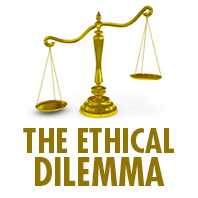The Ethical Dilemma: Do Humanists Crave Church?

Experiencing an ethical dilemma? Need advice from a humanist perspective?
Send your questions to The Ethical Dilemma at hnn@americanhumanist.org (subject line: Ethical Dilemma).
All inquiries are kept confidential.
Do Humanists Crave Church? I recently saw a survey asking humanists to rank how much they’d like to have a place to meet on Sundays, and whether they’d want such meetings to include music, speakers, children’s programs, etc. Basically, it seemed like the survey was trying to figure out to what degree humanists want to create a replica of church. I thought humanists were people who want nothing to do with organized religion and its trappings. Is someone trying to turn humanism into a religion without god?
–Don’t Want to Attend Un-Church Either
Dear Un-Church,
I suspect the survey you have in mind is the one transmitted through the American Humanist Association, conducted by a Duke University graduate student. The stated purpose is to learn more about the humanist movement, with a focus on the U.S. atheist culture and community, especially in relation to community building and political activism; other organizations, both at the national and local level, have or will be invited to participate.
That survey certainly does seem to come from a church-goer’s perspective, down to asking about meetings specifically on Sundays. But that doesn’t mean the results will be skewed toward demonstrating that humanists are just longing to mimic organized religions, although there certainly is movement in that direction. Even if the questions seem to be thinking inside the box (in this case one with a steeple), the survey may reveal useful insight about one of the biggest dilemmas in atheism: how to find community—for values; socializing; emotional support; major life events such as births, weddings and funerals; help in times of need; and political activism—when, as is often noted, organizing atheists can be akin to herding cats.
So if you have been hesitant to respond to the survey, be aware that it includes ample opportunity not only to rank how important—or unimportant—you find various traits typical of churches, but also to add your own comments. If you feel the questions are off track, you can say so, and even suggest what might be better to ask.
The fact that the survey is being disseminated through a non-believer organization’s membership means that it’s reaching atheists who already seek some form of community—probably a small but growing subset of all atheists, many of whom remain unaffiliated with any non-believer groups. Just as the number of avowed atheists is growing, so is interest in forming structured communities to support and empower the identity and rights of un-church-goers everywhere. The results of this study will be published at a future date. Stay tuned.
Syria, Seriously: Everyone keeps asking me what I, as a humanist, think we, as Americans, should be doing about Syria. The same kind of thing has happened with past issues. I hate to seem wishy-washy, but I just don’t know. Not long ago we went to war on the pretext of weapons of mass destruction that never materialized, and now once again I can’t tell who knows what they’re talking about and whether it’s possible to do what’s suggested and accomplish what’s supposed to be accomplished. I realize that in a democracy each citizen is supposed to participate in national decisions, and that humans have a duty to help each other against oppressors. But I just don’t feel I know enough about the reality or the ramifications. Am I deficient? What can I tell people who pressure me for an answer?
–No Way to Weigh In
Dear Way,
You can tell them what you just told us. In a world where flawed opinion polling takes on a life of its own, the media trump up controversies to boost ad revenues, and politicians play games with citizens as pawns, more people should have the guts to stick with “I don’t know” when they don’t know. To see what other humanists have been saying about Syria, check out two recent HNN articles, one for intervention in Syria and one against, on the subject.
Whether you’re for or against or undecided about attacking Syria today or the next hot spot tomorrow probably will have no bearing on what transpires. But expressing your views—even if your view is that you believe you’re not in a position to make an informed decision—might make others rethink their own thinking about this and other issues, instead of jumping on whatever bandwagon is passing by. It would be a good thing if more people were as rational and reasonable and reflective as you. Thinking independently, and drawing conclusions based strictly on solid information, are hallmarks of freethinkers—and of responsible citizens in a democratic society.
Joan Reisman-Brill is a writer based in New York City and certified Humanist Celebrant. She received her BA in English literature from the University of Chicago, an MA also in English lit from the University of Michigan, and an MBA in management and marketing from New York University. She has worked in public relations, marketing and myriad facets of writing and editing for nearly four decades. She has been steadily increasingly her humanist identification and activism at an accelerating rate, and while she doesn’t pretend to have all the answers, she welcomes this opportunity to tackle the questions.
